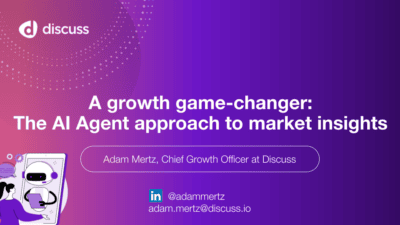Advanced Analysis: Elevating Market Research with Generative AI

Market researchers know that sifting through vast amounts of data can be both time-consuming and overwhelming. But what if there were a way to streamline this process without sacrificing accuracy? Generative AI promises just that, using advanced techniques to analyze data faster than ever before.
With our comprehensive exploration involving numerous expert opinions and case studies, we uncovered how these technologies are reshaping the landscape of market research. Real-time insights offered by generative AI not only enhance analytical efficiency but also provide businesses with the agility needed to stay ahead of competitors. Discovering how these systems work can open new doors for strategic decision-making in your organization.
Generative AI enhances market research by automating data collection, analyzing large datasets from diverse sources, uncovering hidden insights, and providing predictive analysis. By harnessing the power of Generative AI, businesses gain a competitive edge, develop effective marketing strategies, and drive business growth in today’s dynamic and data-driven marketplace.
A Closer Look at Generative AI in Market Research
Generative AI, as we’ve seen, is not just another fancy term. It’s a game-changer in market research and data analysis. Imagine having an assistant who can process and analyze vast amounts of data way faster than you ever could. Generative AI uses advanced algorithms like Natural Language Processing (NLP) to understand human language, enabling it to parse through customer feedback, social media, and even industry trends with ease.
One of the most remarkable things about Generative AI is its ability to produce detailed reports and predictive models based on the analyzed data. This means that market researchers can now harness the power of AI to make sense of complex data sets and uncover valuable insights that were previously hidden within unstructured data. It’s like having a super-powered detective on your team, sifting through evidence to reveal the critical clues you might have otherwise missed.
By automating the data processing tasks that traditionally consumed valuable time and resources, Generative AI empowers market researchers to focus their efforts on interpreting the strategic insights uncovered by these advanced algorithms
Qualitative Research with AI
Qualitative research has always played a crucial role in understanding consumer behavior and preferences. It helps companies dive deep into the human psyche and make sense of complex emotions, motivations, and perceptions. Traditionally, this form of research required time-consuming manual analysis and interpretation of data collected through interviews, focus groups, or observation. But with the advent of generative AI, qualitative research is witnessing a remarkable transformation.
Let’s say you’re working for a company that wants to introduce a new line of skincare products. You decide to conduct qualitative research to understand what factors influence consumers’ purchasing decisions in this market. In the past, this would have meant manually transcribing hours of recorded interviews, organizing the data into themes, and analyzing it for insights. However, with AI-powered transcription software and natural language processing algorithms, the process becomes much more efficient. The software can accurately transcribe audio recordings into text, identify key themes or sentiments expressed by participants, and even generate visualizations that help you quickly grasp patterns and trends.
The benefits of using AI for qualitative research are not just limited to efficiency gains. AI tools can also facilitate better accuracy in data interpretation. They can analyze vast amounts of unstructured data and identify patterns or correlations that may not be immediately apparent to human analysts. For example, they can detect subtle shifts in language use or sentiment over time, which can provide valuable insights into changing consumer preferences or emerging trends.
Key Advantages of Genie
Accelerating Time to Next Gen Insights, Scaling Global Human Centricity
Genie, the generative AI suite of tools, offers numerous advantages that elevate market research to unprecedented levels. Harnessing the latest and most powerful technology, Genie empowers businesses to extract actionable insights on a global scale, quickly and effectively. In this section, we will explore some of the key advantages of using Genie in market research.
One of the key advantages of Genie is its ability to automate and streamline the data analysis process. Traditionally, market researchers had to spend hours manually analyzing data sets, searching for patterns and insights. With capabilities to summarize live and asynchronous research, highlight project-level themes and quotes, find quotes and summaries to specific research objectives, and suggest or auto-magically create highlight reels, Genie accelerates the analysis process down to minutes. Genie automates time-consuming tasks, allowing researchers to focus on interpreting the insights. For example, a major telecommunications company used Genie to analyze customer feedback data across various platforms. By automating the analysis process, they were able to identify common issues and quickly implement targeted solutions, ultimately improving their customer satisfaction rates.
Furthermore, Genie enables market researchers to uncover hidden trends and connections within their data. It has the capability to identify correlations that may not be apparent to human analysts. This advantage is particularly valuable when dealing with large datasets that are too complex for manual analysis. For instance, a global e-commerce platform utilized Genie to analyze customer preferences and purchasing patterns. The AI tool identified an unexpected correlation between certain product categories and specific demographics, enabling the company to create more targeted marketing campaigns and increase sales.
Another advantage of using Genie in market research is its ability to provide real-time insights. Traditional research methods often require significant time and resources before valuable findings can be obtained. Conversely, Genie’s advanced algorithms enable researchers to analyze data instantly as it becomes available. This real-time capability is invaluable in fast-paced industries where quick decision-making is crucial. A retail chain leveraged Genie during a promotional campaign to track customer responses in real-time. By analyzing the data on-the-go, they were able to adjust marketing strategies and optimize the campaign results while it was still running.
Additionally, as a global solution, Genie synthesizes key themes across multi-language interviews, providing English summaries, allowing for comparisons of findings across regions and providing a broader global perspective. With GenAI-powered instant recaps, project summaries, and thematic analysis available for over 100 countries, and growing, researchers can propel human centricity in every corner of the world.
Leveraging Predictive Analysis
Predictive analysis is akin to using a crystal ball to foresee what might happen in the future. Just like predicting the weather, businesses utilize predictive analysis to anticipate changing market conditions and consumer behavior. It’s somewhat reminiscent of having a time-traveling market analyst who can inform you about what’s coming around the corner based on historical data and patterns.
Forecasting Market Trends: This is where generative AI truly excels. By analyzing past market trends and customer behavior, it can identify emerging patterns and foresee future demands. For example, it might predict a surge in demand for sustainable products, enabling businesses to adjust their product lines and marketing strategies accordingly. This proactive approach allows companies to stay ahead of the curve and capitalize on upcoming trends before they even begin.
Scenario Modeling: Ever played “what if” games to see how different choices might lead to different outcomes? That’s exactly what scenario modeling in predictive analysis does for businesses. It simulates various market scenarios, such as changes in pricing strategies or shifts in customer preferences. This allows companies to experiment with different approaches without risking real-world resources, ultimately selecting the most effective and profitable strategies.
Imagine being able to test out different pricing strategies or advertising campaigns before actually putting them into action, reducing the risk of making costly mistakes when new products are launched.
Risk Management: No one can predict the future with 100% accuracy, but predictive analysis comes pretty close. By forecasting potential economic conditions and market risks, businesses can develop robust contingency plans. In this way, they can safeguard themselves against unexpected downturns and navigate through uncertain times more effectively.
For instance, an airline company might use predictive analysis to anticipate changes in fuel prices and plan its ticket prices accordingly. Similarly, a retail business could use predictive models to forecast consumer spending patterns during economic fluctuations and adjust inventory levels accordingly.
By leveraging predictive analysis, businesses can not only stay ahead of market trends but also prepare for various outcomes, ultimately leading to more informed decision-making and risk mitigation.
Now, let’s pivot our understanding from theoretical applications to practical implementations in real-world business scenarios.
Practical Applications in Business
Generative AI offers businesses a suite of practical applications that can revolutionize their market research and decision-making strategies. One such application is Target Audience Analysis.
Target Audience Analysis
Using Generative AI for target audience analysis allows businesses to understand their consumers on a much deeper level. By segmenting audiences more effectively, specific consumer needs and preferences can be identified. This means that companies can tailor their products to better respond to the unique demands of different customer groups. For instance, AI can assist in determining which product features are most appealing to a particular demographic, aiding in product development. With this insight, businesses are empowered to craft products and services that resonate with their target markets on a more profound level.
Moreover, utilizing Generative AI in competitive analysis provides an edge in the market landscape. By leveraging AI tools to dissect competitors’ strategies and performance, businesses gain actionable insights that drive strategic decision-making.
Competitive Analysis
Through Generative AI, companies can effectively monitor and analyze their competitors’ pricing strategies, marketing campaigns, and even customer reviews. This wealth of information enables businesses to stay ahead in the market by identifying gaps and opportunities within their own offerings. Consequently, it allows for informed decisions on how to position products and services vis-a-vis competitors, leading to enhancing brand positioning and competitive advantage.
It’s not just about understanding the market trends and competition; Generative AI also enables personalized marketing initiatives, increasing engagement and conversion rates by tailoring content to individual preferences.
Personalized Marketing
One of the transformative applications of Generative AI is its role in creating personalized marketing content. By analyzing user behavior and preferences, businesses can deliver highly targeted advertisements and promotions to individual consumers. This level of personalization significantly boosts engagement and conversion rates as customers receive communications and offers that resonate with their specific interests and needs.
In essence, these practical applications demonstrate how Generative AI can act as a catalyst for pushing our traditional approaches towards market research and business operations into an era of unprecedented efficiency, customization, and strategic clarity.
As we consider the remarkable potential of Generative AI in reshaping market research practices, the next frontier lies in exploring the future trends and innovations anticipated to further amplify its impact.
Future Trends and Innovations
As we advance further into the 21st century, the role of AI in market research is poised to undergo significant evolution. Let’s dive into some key areas of anticipated development and innovation.
Advanced AI Integration
The integration of advanced AI systems into market research processes is expected to revolutionize how businesses generate insights. AI won’t just assist with market research; it will also play a pivotal role in enhancing other vital business functions such as customer service and supply chain management. This increased integration has the potential to streamline operations and foster more comprehensive decision-making.
This anticipated growth suggests that AI will soon become a strategic ally across multiple facets of an organization’s operations, signaling a holistic transformation in how businesses engage with data and consumer insights.
Imagine a network of interconnected AI tools working together seamlessly, where insights from market research inform customized customer service strategies, optimize supply chain operations, and fuel strategic decision-making across the entire organization.
Ethical AI and Data Privacy
With the rapid advancement of AI technologies, there is an increasing emphasis on ethical use and data privacy. The evolution of regulations and guidelines surrounding the ethical use of AI will prompt businesses to adopt more transparent practices to protect consumer data. As consumers become more aware of data privacy concerns, businesses will need to demonstrate accountability in their use of AI technologies.
This shift towards ethical AI signifies a crucial juncture in the development and integration of AI into market research and business operations. Businesses will need to prioritize responsible practices and data protection, not only to comply with regulations but also to bolster consumer trust. Transparency will be paramount in ensuring the ethical use of AI for market research.
AI-Driven Decision Support Systems
The coming years are poised to witness a significant uptick in the sophistication of AI decision support systems. These advanced systems are projected to offer strategic recommendations based on comprehensive market analysis. For instance, AI may provide optimal investment areas by analyzing vast datasets, thereby empowering businesses with informed decision-making capabilities.
The progression towards more robust AI-driven decision support systems represents a paradigm shift in how businesses leverage technology for strategic planning and resource allocation. By harnessing the power of AI-generated insights, businesses can anticipate more proactive and data-driven decision-making processes that strategically align with market dynamics and consumer behaviors.
In essence, the future trends and innovations in AI for market research promise to redefine how businesses harness data, interpret consumer behavior, and navigate the complex terrain of the marketplace. The evolving role of advanced AI integration, ethical considerations, and sophisticated decision support systems underscores the transformative potential of AI in shaping the future of market research and business operations.
To explore how Discuss can elevate your market research efforts with generative AI-powered, human-centric insights, get started today!
Ready to unlock human-centric market insights?
Related Articles

6 ways AI Agents are redefining global human understanding
Shatter surface-level thinking and build true human understanding with AI Agents We’re overwhelmed by data—but starved for connection. In an…
Shatter surface-level thinking and build true human understanding with AI Agents We’re overwhelmed by data—but starved for connection. In an…

How AI Agents are Redefining the Future of Market Insights
The world of artificial intelligence is moving at lightning speed, and the concept of AI agents has brought about the…
The world of artificial intelligence is moving at lightning speed, and the concept of AI agents has brought about the…

Part 3: Generative AI – Market Research Angel or Devil? How to ensure you win in this new era
By Adam Mertz, Chief Growth Officer at Discuss In part one of this blog series I spent time reviewing the…
By Adam Mertz, Chief Growth Officer at Discuss In part one of this blog series I spent time reviewing the…



